BRICS overview 2024
I have covered this topic a few times in my articles like June 12, 2024 “Summer potpourri” and “BRICS Summit” August 28, 2023.
In today’s world, there are also certain other “strengthening important entities”: SCO (Shanghai Cooperation Organization), BRI (Belt and Road Initiative), EAEU (Eurasian Economic Union) and Greater Eurasian Partnership. All these entities have been explained in the article of August 28, 2023. I will release a new updated article on this subject later in 2024.
In the article of June 12, 2024, I said
“BRICS is actively seeking to establish a new currency on the world stage, aiming to challenge the dominance of the US dollar. This initiative comes amid concerns about the impact of US sanctions on countries such as Russia and other emerging economies. Before the official introduction of the BRICS currency, member countries actively promoted trade in local currencies. The upcoming BRICS summit, scheduled for October 2024 in Russia’s Kazan region, promises to reveal more details about this currency venture.”
This is true, the use of local currencies is increasing significantly among BRICS countries. President Putin stated that
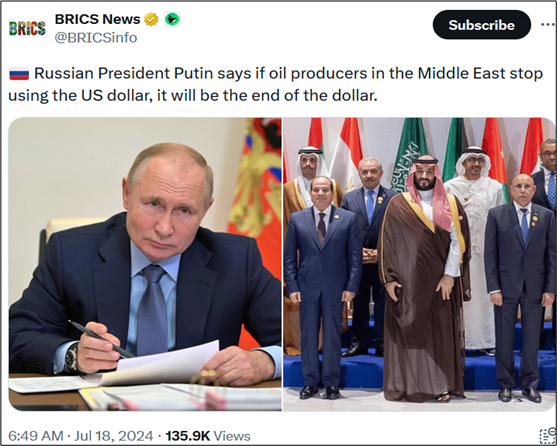
Saudi Arabia, who is already the full member of BRICS, is increasing the use of yuan in oil trade with China. Other new, oil producing BRICS members, Egypt, Iran and UAE are also using more other currencies than US dollar in their oil business.
In the article of August 28, 2023, you can find the comprehensive data/info package of BRICS and the bloc’s latest Summit on August 22-24 in Johannesburg, South Africa.
Summit of BRICS Foreign Ministers on June 10-11, 2024, in Nizhny Novgorod, Russia
Russia took over the year-long presidency of the BRICS group on January 1, 2024. Over 250 events are expected to be held as part of Moscow’s BRICS Presidency, which will culminate in the group’s summit in Kazan in October. Foreign ministers from the members of BRICS will gather on 10-11 June in the Russian city of Nizhny Novgorod for an annual meeting. This will be the group’s first regular meeting since BRICS expanded this year to include new members Egypt, Ethiopia, Iran, and the United Arab Emirates.
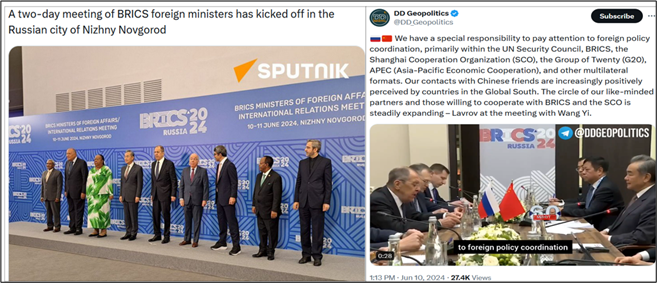
Foreign ministers from some non-BRICs members were invited, too, most notably Turkish Foreign Minister Hakan Fidan, who will attend. The sides are set to discuss multilateral cooperation and preparation for the 22-24 October BRICS leaders’ summit in Kazan, Russia. Almost all leaders of BRICS countries have confirmed their participation in the group’s summit set to take place in the Russian city of Kazan, Russian Foreign Minister Sergey Lavrov told reporters on the sidelines of the St. Petersburg International Economic Forum (SPIEF).
The parties were discussing current issues of international relations, international agenda, improvement of the global governance system with emphasis on strengthening the role of developing countries, conflict resolution and interaction in leading multilateral platforms. Within the framework of the Foreign Ministers’ Meeting, a separate meeting will also be held with the participation of a number of countries of the Global South and East. Preparations for the upcoming 16th BRICS summit, which will be held in Kazan in October, are on the agenda. Russian Foreign Minister Lavrov will hold a “marathon of bilateral meetings” on the sidelines of the meeting in Nizhny Novgorod.
Russia welcomes Ankara’s interest in the work of BRICS, Putin said at a meeting with Turkish Foreign Minister Fidan. The Russian Federation notes with gratitude Turkey’s attitude towards resolving the crisis around Ukraine. It is not Russia’s fault that the “grain deal” was not extended. Moscow will be in contact with Ankara regarding the initiatives of the Turkish side on the situation in the Black Sea.
Now full members of the association include Brazil, Russia, India, China, South Africa, Egypt, Iran, UAE, Saudi Arabia, and Ethiopia. Around 30 more countries want to cooperate with BRICS in various formats. The BRICS foreign ministers, who gathered for a meeting in Nizhny Novgorod, have agreed upon a joint statement.
The 10th jubilee BRICS Parliamentary Forum in St. Petersburg, July 11-12, 2024
The central topic of the forum is “The Role of Parliaments in the Strengthening of Multipolarity for Fair Global Development and Security”. Russian President Vladimir Putin will attend the 10th jubilee BRICS Parliamentary Forum.
Putin’s participation in the forum was announced by speaker of Russia’s Federation Council, or upper house of parliament, Valentina Matviyenko. This information was confirmed by Putin’s press secretary Dmitry Peskov, who told that Putin will hold a number of separate meetings with participants in the forum on its margins.
According to the Federation Council’s press service, around 400 delegates from 16 countries, including Russia, are expected to take part in the forum that will be held on July 11 and 12.
The forum will be attended by a delegation of the Russian State Duma (lower house of parliament) led by its speaker Vyacheslav Volodin, Russian Deputy Foreign Minister Sergey Ryabkov, St. Petersburg governor Alexander Beglov, as well as lawmakers from Brazil, Egypt, India, Iran, China, the United Arab Emirates, Ethiopia, South Africa, representatives from the Interparliamentary Union, CIS Interparliamentary Assembly member states – Azerbaijan, Armenia, Belarus, Kazakhstan, Kyrgyzstan, Tajikistan, and Uzbekistan.
Alexander Dvoinykh, chair of the Federation Council’s agrarian and food policy committee, described the forum as a unique platform for discussing most important issues, such as food security in the world.
During the Parliamentary Forum, it is planned to sign a protocol to the memorandum of understanding and pass a joint declaration. A number of meetings between the speakers of both houses of Russian parliament with their foreign colleagues are expected to be held on the sidelines of the forum. Apart from that, a session of the Council of the CIS Interparliamentary Assembly will be held on July 12.
BRICS may create a parliamentary body in the future, Russian President Vladimir Putin said, addressing the BRICS Parliamentary Forum. “BRICS does not yet have its own parliamentary institution,” he noted. “However, I believe that the idea will definitely be implemented in the future,” Putin said. “I am confident that your forum will facilitate the process,” the Russian president added.
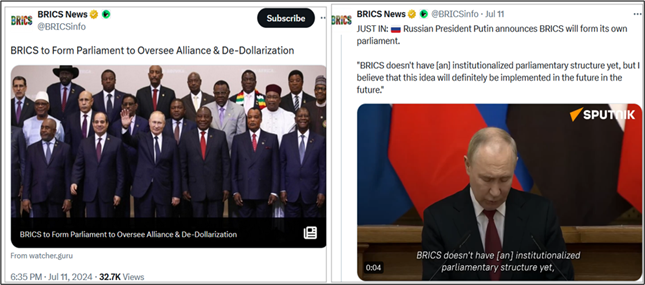
BRICS has turned into one of the world’s largest economic centers since its foundation 15 years ago, with the share of its members in the global economy already exceeding that of G7 countries, Duma Speaker Vyacheslav Volodin said.
Despite challenges and sanctions, Russia has become the world’s fourth-largest country on GDP in terms of purchasing power parity (PPP) and remains Europe’s first economy, he said. China tops the ranking, while India comes in third. Brazil has risen to the seventh spot. Among top 25 countries are also a number of new BRICS members, including Egypt (17th) Saudi Arabia (18th), Iran (22nd). The share of BRICS nations in global GDP on PPP has grown to 36.8%, outpacing the share of G7 of 29%. This gap will only increase, Volodin stressed.
Bloc’s expansion and action plans for 2024
BRICS Membership
The BRICS group has seen two waves of expansion since its establishment in 2006. In 2011, South Africa joined the four founding nations of Brazil, Russia, India and China. In August 2023, six new members, including Argentina, were invited to join the group. However, Argentina turned down the invitation in late December. Five new members – Egypt, Iran, the United Arab Emirates, Saudi Arabia and Ethiopia – were integrated into the BRICS family on January 1, 2024. Thus, the full members of the association now include Brazil, Russia, India, China, South Africa, Egypt, Iran, UAE, Saudi Arabia, and Ethiopia.
Regarding new member candidates, in the beginning of 2024, 14 more countries have formally applied to join BRICS: Azerbaijan, Algeria, Bahrain, Bangladesh, Belarus, Bolivia, Cuba, Honduras, Kazakhstan, Kuwait, Pakistan, Palestine, Senegal, Thailand, Venezuela, Vietnam. In addition, further expansion is possible: Afghanistan, Angola, Comoros, Chad, DR Congo, Gabon, Guinea-Bissau, Equatorial Guinea, Eritrea, Indonesia, Libya, Mexico, Morocco, Myanmar, Nigeria, Nicaragua, Serbia, Sri Lanka, South Sudan, Sudan, Syria, Tunisia, Turkey, Uganda, Uruguay and Zimbabwe have expressed interest in membership of BRICS. The sides are set to discuss multilateral cooperation and preparation for the 22-24 October BRICS leaders’ summit in Kazan, Russia.
Referring to the above expressed interest, BRICS may emerge as the second largest bloc just after the UN. If considering the potential members in the near future, it may be a group of around 50 countries. BRICS have a potential to emerge as a largest alliance with largest area, population, resources and may transform the largest economy soon.
Only countries that don’t engage in a policy of illegal sanctions against other countries can be admitted to BRICS, Russian Deputy Foreign Minister Sergey Ryabkov said. “One of the key criteria for the BRICS membership or for being admitted as a partner state is the applicants’ non-participation in the policy of illegal sanctions, illegal restrictions against any of the BRICS members, first of all, Russia,” he told a news conference, June 18.
Southeast Asia’s sudden pivot toward the BRICS nations is a global game-changer that few in Washington saw coming. ASEAN countries are lured by access to financing and a political movement independent of Washington’s influence. Southeast Asia has its reasons for pivoting to BRICS. In recent days, Malaysia detailed its ambitions to join the bloc, Thailand and Vietnam are also among the Association of Southeast Asian Nations members expressing similar interest. In Indonesia, there’s growing awareness that Egypt, Ethiopia, Iran, United Arab Emirates, Saudi Arabia and other “Global South” nations have a point to join this burgeoning intergovernmental organization.
Action plans and performance
Russia will chair BRICS in 2024 under the motto “Strengthening Multilateralism for Equitable Global Development and Security.” According to the Russian Foreign Ministry, the country plans to hold more than 200 events of various levels, which will be hosted by more than a dozen Russian cities. The BRICS foreign ministers will meet in Nizhny Novgorod in June, and the high-level summit will be held in Kazan in October.
BRICS has also created significant initiatives, from which the following can be mentioned:
The New Development Bank (NDB), formally referred to as the BRICS Development Bank, is a multilateral development bank operated by the five BRICS states. The bank’s primary focus of lending is infrastructure projects with authorized lending of up to $34 billion annually. South Africa hosts the African headquarters of the bank. The bank has a starting capital of $50 billion, with wealth increased to $100 billion over time. It is not a replacement of existing global financial institutions, like World Bank, IMF and Asian Development Bank but, is supporting the existing financial system.
The BRICS Contingent Reserve Arrangement (CRA) is a framework for providing protection against global liquidity pressures. This includes currency issues, where members’ national currencies are being adversely affected by global financial pressures. Emerging economies that experienced rapid economic liberalization went through increased economic volatility, bringing an uncertain macroeconomic environment. The CRA competes with the International Monetary Fund (IMF). Along with the New Development Bank, it is an example of increasing South-South cooperation. It was established in 2015 by the BRICS countries.
BRICS Partnership on New Industrial Revolution innovation Center (BPI). China, being the most important member of the BRICS, has established this Center (BPI). In November 2020, President Xi Jinping announced that China will set up an innovation center for BRICS partnership on new industrial revolution in Xiamen City of Fujian province with a clear focus on policy coordination, personnel training and project development. It has become an important platform for the BRICS members to promote partnerships and to leverage each other’s strengths to develop and prosper against the background of the Fourth Industrial Revolution.
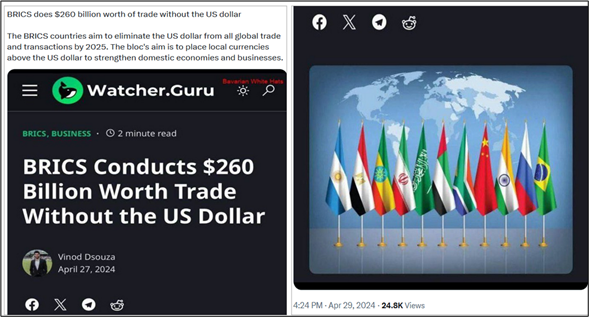
De-dollarization process
BRICS payment system. At the 2015 Summit in Russia, the BRICS finance ministers initiated consultations for a payment system that would be an alternative to the SWIFT system. The stated goal was to move to settlements in national currencies. China launched its own alternative to SWIFT: the Cross-Border Interbank Payment System, India also has its alternative Structured Financial Messaging System (SFMS), as do Russia SPFS and Brazil Pix.
Potential common currency, BRICS countries committed to study the feasibility of a new common currency or similar, at the 2023 BRICS summit in South Africa. Fair and easier international trade as well as a major reduction in costs of transactions would be some of the reasons why the countries could forge a currency union. Dependence on US Dollars may be reduced drastically.
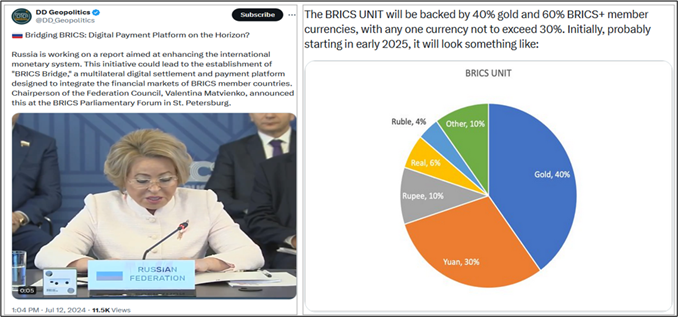
The BRICS Will Use a Gold Standard
ZeroHedge, an article by VBL, Tuesday, Jul 09, 2024 – 19:07
The BRICS are definitely pursuing a Gold standard. For the West, this means one thing. If a Western Nation wants to trade with BRICS for certain goods, it needs more gold. If the West does not wish to trade with the BRICS for those items, then they must relocate their supply chains sufficiently in natural resources to obviate the need for the BRICS resources. The question will be: Which is less expensive and less dangerous to do?
BRICS: Russia, China & India ditch US Dollar in 95% of trade. A firm sign of growing BRICS de-dollarization efforts, Russia, China and India have ditched the US dollar in 95% of bilateral trade during 2024. Indeed, the Secretary General of the International Chamber of Commerce (ICC) Tatiana Mohaghan, revealed the massive shift in currency usage in Russia’s dealings with the two countries. The shift was defined by a massive increase in local currency usage in the trade between Russia and the two BRICS nations. Moreover, the ICC reported that Russia’s export settlements in either the US dollar or the Euro also fell drastically. Specifically, it has fallen from more than 85% in 2021 to just 34% last year.
Over the last year, the BRICS economic alliance has not been shy about its de-dollarization plans. Indeed, amid increased Western sanctions on Russia, the country shifted its trade focus. As a result, the bloc has increased its overall usage of local currencies in bilateral trade.
The ICC has stated that Russian ruble usage in cross-border transactions has increased by 39% from 2021 to 2023. Moreover, friendly country currencies also increased over the same time frame. Altogether, the shift in focus on trade settlement was put into action for the first time last year and is expected to grow significantly throughout 2024.
The BRICS countries will actively seek solutions to remove financial interaction from Western influence, Russian Deputy Foreign Minister and Russia’s representative in BRICS Sergey Ryabkov said at a press conference following the first meeting of the representatives of all ten BRICS nations in early February 2024, in Moscow. Ryabkov said that constructive discussions were held on a range of topics within the “three baskets” of cooperation in BRICS: politics and security, economy and finance and humanitarian ties.
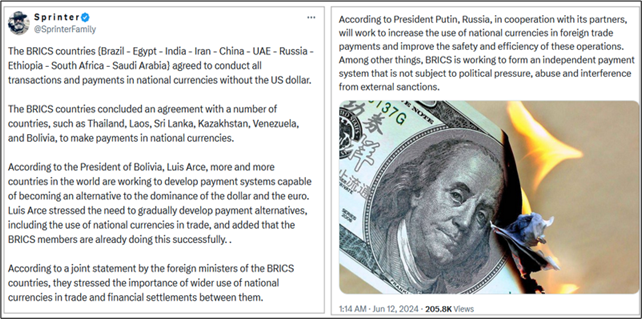
February 27, Russia will propose to the BRICS members to form an alternative banking structure to secure trade operations that are politically autonomous, Russian Finance Minister Anton Siluanov told Bloomberg Saudi Arabia TV on the sidelines of a meeting of BRICS finance ministers and central bank governors in Sao Paulo, Brazil.
“In order for the BRICS countries to develop normally, we need to think about creating our own financial systems functioning independently of politics and ensuring trade relations between our countries,” Siluanov said. Trade among the BRICS countries is expanding and a reliable payment mechanism is needed. “Today we will propose to establish an independent settlement payment system based on new principles, first and foremost digital and blockchain principles, principles that could be comfortable for countries, inexpensive for making payments and clear,” Siluanov stated.
BRICS is actively seeking to establish a new currency on the world stage, aiming to challenge the dominance of the US dollar. This initiative comes amid concerns about the impact of US sanctions on countries such as Russia and other emerging economies. Many nations in Asia, Africa and Latin America are considering reducing their reliance on the US dollar.
South African Ambassador Kwele admitted in interview the progress made towards a common BRICS currency. He highlighted the alliance’s efforts to promote the use of local currencies among member states in order to mitigate the risks associated with excessive dependence on the US dollar. Before the official introduction of the BRICS currency, member countries actively promoted trade in local currencies.
Ambassador Kwele revealed plans for a meeting between Finance Ministers in May to further discuss this currency initiative. The upcoming BRICS summit, scheduled for October 2024 in Russia’s Kazan region, promises to reveal more details about this currency venture.
More information about this topic, link here below
Modern Diplomacy, an article by Tuhu Nugraha, Digital Business & Metaverse Expert Principal of Indonesia Applied Economy & Regulatory Network, March 31, 2024
The rapid digital transformation has led to the emergence of innovative initiatives like mBridge and the SWIFT CBDC project, both aiming to revolutionize cross-border transactions.
BRICS countries back Russia’s initiative to create grain exchange, June 28, Moscow
The BRICS countries supported Russia’s initiative to create a grain exchange, Agriculture Minister Oksana Lut told reporters following the 14th meeting of the BRICS agriculture ministers. “Now, in accordance with the instructions of the President Putin, we will work together with our colleagues on the creation and development of this platform and the development of the possibility of settlements in national currencies of the BRICS countries,” Lut said.
At the meeting the ministers also touched upon the key issues of BRICS food security, as well as global food security, she added. “The BRICS countries now make up about 30% of all arable land in the world. We jointly produce about 40% of grain crops, 50% of fish, 50% of dairy products worldwide. Therefore, in fact, the BRICS countries are a key platform for ensuring global food security,” Lut said.
BRICS in the Big Picture
Professor Pramod Rai, Research Fellow and Assistant professor at Mumbai University, shared his views on the building new world order, future of Eurasian cooperation and the new multilateral-multipolar global order: “BRICS Should Be Radical Revolutionary Step to Oust West Oriented International Order”.
“BRICS+ in 2024 unites 45% of the earth’s land, 46% of the global population, approximately 46% of the global GDP, not less than 25% of global trade, 32% of the world output of natural gas, 43% of crude reserves, and 38% global petroleum imports.
BRICS as an organization is in evolutionary process of building new world order. BRICS should be a radical revolutionary step to oust the present West oriented international order. In my view, although the BRICS has been emerging as a trusted organization, it still has to do much to demonstrate its full capabilities and rationality. The biggest challenge for the BRICS is not to follow or become the typical western model and mechanisms in its functioning but showing the pragmatism and getting results should be the highest goal at the present juncture.
According to Rai, the future of Eurasian cooperation would indeed massively contribute to the nature of the new multilateral-multipolar world order. Russia is an indispensable state and an influential power of the region, due to its greater geo-economic and geo-political interests. Since China has already activated its commercial programs and policies there, India should also accelerate its moves in the region, the expert concluded.
“But of course, the main stakeholder countries of the Eurasian landmass should have a clear vision about the coming global order. Although the criticality of the west still stays, the Eurasian future depends on the countries like Russia, India and China. Whatever moves, they would make a profound impact on the region and for the coming post-west international order,” Pramod Rai said.
The need for a new world order is a recurring theme now, when the unipolar world is falling behind and the era of a multipolar world is emerging. For the US, as the falling global hegemon, it involves adjusting to the reality of a shifting balance of power, which the US must come to terms with. Yet, nostalgia for the era of American supremacy is still very much in evidence today.
US leaders and their allies, continually resisting any geopolitical challenge that would affect their national interests, have been able to engage in successful interventions and military campaigns against countries in Latin America, Africa, Europe, Asia and the Pacific.
Today, new forces have emerged to challenge the existing world order: one of them is BRICS, then Chinese BRI, Asian SCO, Eurasian EAEU as well as Greater Eurasian Partnership. These new forces cover about seven billion people or over 80% of the world’s population. So called “western bloc” represents approx. 20% of world’s population.
The end game in the new world order is going. There can be no doubt that Western leaders and media will try every trick to discredit BRICS and other above-mentioned forces. There will also be attempts to divide the members and undermine the achievements and future plans of these forces. But it is clear that history is being revised by the global South and this time around, there will be no turning back.
Closing words
I have examined this topic, BRICS in the big picture, many times, here below some important:
February 28, 2022 | Seppo Niemi
World order and polarity transforming 2022
March 21, 2022 | Seppo Niemi
Cyclical transformation turning into doomsday
April 2, 2022 | Seppo Niemi
New World Order in the making
January 12, 2023 | Seppo Niemi
New currency system, BRICS and SCO
April 12, 2023 | Seppo Niemi
De-dollarization goes on, April 2023
October 22, 2023 | Seppo Niemi
Great power relations in the context of the third BRI Forum
When considering the position and prospects of the EU or Europe on the whole, the destiny of Europe seems to be gloomy. Majority of European political leaders have made fatal wrong decisions and serious miscalculations without realizing the actual historical transformation process and paradigm change taking place in the current world affairs. BRICS is mainly an unknown entity to them and its progress is incomprehensible.
Current political leaders in Europe will be left on the “wrong side of history” and at the end of this century they will be remembered as politically completely blind and incompetent in comprehending realities of the world around.
FOR FURTHER READING:
Natixis Corporate and Investment banking, Research Report, January 29, 2024
Potential Geoeconomic and Geopolitical Consequences of an Expanded BRICS
Global Research, article by Prof. Abdullahi Shehu and Prof. Maurice Okoli, February 15, 2024
BRICS and the Global South Cooperation
Modern Diplomacy, article by Kester Kenn Klomegah, independent researcher, April 3, 2024
New BRICS Members’ Perspectives on Exploiting Potential Benefits
Modern Diplomacy, article by Dr. Nadia Helmy, May 31, 2024


